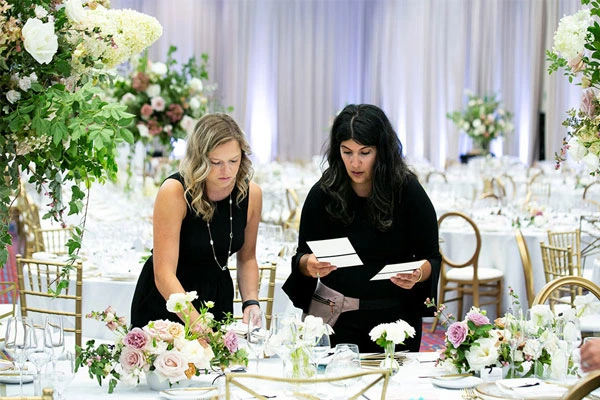Organizing a special and memorable wedding requires precise planning and various skills. Below, we discuss several important items that must be considered for hosting an excellent wedding ceremony:
Time and Venue
Determining the date and exact time of the ceremony:
Choosing a suitable venue based on the number of guests and ceremony requirements. Firstly, you need to determine the exact number of guests you intend to invite. This number can determine the size of your chosen venue. You must also decide whether your ceremony will take place indoors in a hall or outdoors, such as on the beach, in a garden, villa, or hotel. The choice depends on the style and theme of your ceremony, and the selected venue should be suitable for your ceremony’s decorations and arrangements. If you need a beautiful scenery, consider a venue with natural views like the sea, mountains, or beautiful gardens. Choose a location that aligns with your budget.
The rental costs of the venue and related services should be within your budget. Different venues may have different regulations; make sure the chosen venue complies with local regulations and necessary permits. If your guests are from out of town, there should be suitable hotels and accommodations near your chosen venue. Considering these factors, for selecting a suitable venue for a wedding ceremony in Antalya, you should conduct thorough research and contact event planning companies specializing in this field to ensure that the chosen venue is compatible with your needs and preferences.
Planning and Budget
Planning for a wedding is one of the crucial stages in organizing this event. Firstly, you need to determine your wedding budget and then calculate various expenses in detail. The following explanations are provided for budget determination and calculating various expenses: Start by discussing with your partner and determine how much money you can allocate for your wedding. Consider the following for budget determination:
Number of guests: The number of guests significantly influences the cost determination.
Venue: The wedding venue (hall, home, outdoor space, hotel, etc.) plays a crucial role in expenses.
Day and time selection: Weddings on popular days and peak hours tend to be more expensive.
General and specific wedding costs
Specific costs: Including bride and groom attire, wedding rings, jewelry, engagement tablecloth, bride’s bouquet, wedding cake, makeup and hairstyling services, bridal car, music, and decoration costs (flower, curtains, tables, chairs, lighting).
Photography and videography services: Costs related to capturing photos and videos of the ceremony.
Always allocate a budget for extra and unexpected expenses, including unforeseen changes, celebrations, and other gifts.
Decoration
Designing and decorating the wedding ceremony venue can become one of the most attractive and creative aspects of organizing this event. Below are some explanations regarding the design and decoration of the wedding ceremony venue.
Flowers
Flowers play a significant role in decorating tables, curtains, and the wedding venue. The choice of flowers is based on the theme and style of the ceremony, and both fresh and artificial flowers can be used. Flowers are placed in locations such as the entrance, tables, columns, and the façade of arches.
Curtains
Curtains, serving as the backdrop for the wedding ceremony, can be attractive and beautiful. Soft and transparent fabrics are usually used for curtains, and they can be combined with flowers, lights, and other decorations.
Tables and Chairs
Tables and chairs should harmonize with the overall decoration of the wedding ceremony. Beautiful table settings and chair covers are used, and the bride and groom’s table, in particular, should be specially decorated.
Lighting and Illumination
Appropriate lighting is crucial for creating a romantic and pleasant atmosphere. Hanging lights, candles, table lamps, and background lighting can be used.
Cake and Dessert Table
The cake and dessert table should be attractive and delightful, using floral decorations and attractive cake toppers.
Other Decorative Elements
Other decorations such as leatherwork, crowns, and traditional ornaments can also enhance the venue’s decor.
Matching the Wedding Style
All the above elements should align with the style of the wedding ceremony. For example, if your ceremony is simple, use decorations with natural and simple elements.
Use of Colors
Colors are chosen based on your desired color palette and complement decorations such as flowers, curtains, and other items.
Consultation with a Decorator
Consulting with a professional decorator can help you create an appropriate design and choose the best decorations. A skilled decorator can provide you with the most beautiful and suitable decor.
When all these elements come together, your wedding venue transforms into a charming, beautiful, and captivating space, creating a special and attractive wedding atmosphere. Designing and decorating the venue (flowers, curtains, tables, and chairs, etc.) create an impressive and inviting ambiance.
Host and Execution Team
Choosing a host or program coordinator, you should have a team for executing the ceremony, including service and hospitality staff, drivers, transportation services, photographers, videographers, DJs, and more.
Food and Beverages
Selecting the menu and designing the catering program includes appetizers, main courses, desserts, beverages, etc. Considering the guests’ needs and preferences is crucial, taking into account factors such as food allergies.
Incorporating all these elements ensures a well-organized and aesthetically pleasing wedding ceremony that caters to both visual and practical aspects of the event.
Music and Entertainment
Ensuring an unforgettable wedding experience involves carefully selecting the musical elements that will set the tone for the celebration. This includes deciding on a live music band, a talented singer, or an energetic DJ to cater to the diverse tastes of the guests. In addition to music, the entertainment aspect is broadened to include the planning of various engaging activities. From lively dance performances that add a vibrant touch to the celebration to mesmerizing fire performances that captivate the audience, and even special shows tailored for children, every entertainment element contributes to the overall joy and celebration.
Photography and Videography
Preserving the precious moments of a wedding day is entrusted to skilled photographers and videographers. By hiring professionals in the field, the couple ensures that every special and emotionally charged instant is captured with artistic finesse. From the exchange of vows to the first dance, the photographers work diligently to immortalize the essence of the day, while videographers create cinematic narratives that tell the story of the couple’s love and commitment.
Bride and Groom Attire
The attire worn by the bride and groom holds immense significance, reflecting not only their personal style but also the theme and ambiance of the wedding. The careful selection of wedding attire involves consideration of various factors, such as the couple’s taste, cultural preferences, and the overall aesthetic they wish to convey. From the bride’s stunning gown to the groom’s dapper suit or traditional attire, every detail contributes to the visual spectacle of the ceremony.
Hosting and Hospitality
The art of hospitality plays a pivotal role in ensuring the comfort and enjoyment of the guests. Thorough planning is undertaken to provide a warm and welcoming atmosphere both before and during the ceremony. From coordinating accommodation for out-of-town guests to organizing pre-ceremony gatherings, the hosting and hospitality aspects contribute to the overall positive experience of everyone attending the celebration.
Invitation Cards
The first glimpse of the wedding celebration is often conveyed through intricately designed invitation cards. These cards serve as more than just a formality; they are a visual representation of the couple’s style and the theme of the wedding. Designing and printing invitation cards involves careful consideration of aesthetics, ensuring that they not only convey the necessary information but also set the tone for the celebration.
Prizes and Gifts
Expressing gratitude to guests and creating lasting memories involves thoughtful consideration of prizes and gifts. Commemorative gifts and prizes add a personal touch to the celebration, serving as tokens of appreciation for the presence and support of friends and family. From personalized keepsakes to special awards for certain guests, these items contribute to the overall sentiment of gratitude and joy.
Program Schedule
A well-organized and detailed schedule is the backbone of a smoothly run wedding ceremony. Crafting a program schedule involves meticulous planning of each segment of the day, from the arrival of guests to the final farewell. This ensures that every element seamlessly transitions into the next, creating a cohesive and enjoyable experience for everyone in attendance.
Equipment Rental
Considering the rental of essential equipment such as tables, chairs, and sound systems is crucial for the practical execution of the ceremony. Rental services are chosen based on the specific needs of the event, ensuring that the venue is equipped to accommodate guests comfortably and that the audio-visual aspects are seamlessly integrated into the celebration.
Insurance
Acknowledging the importance of unforeseen circumstances, the inclusion of event insurance in the planning process is a wise decision. Insurance coverage provides financial protection in case of unexpected events, allowing the couple to approach their wedding day with greater peace of mind.
Security Measures
Safety and security are paramount during any large-scale event, and a wedding is no exception. Developing comprehensive security plans involves assessing potential risks and implementing measures to ensure the well-being of everyone present. From crowd control to emergency response protocols, a well-thought-out security plan contributes to a smooth and secure celebration.
In light of this extensive checklist, meticulous planning and seamless coordination among all these crucial elements are imperative for the success of a wedding celebration. Leveraging diverse resources and seeking guidance from relevant specialists and advisors can further enhance the overall planning process. In this context, the expertise offered by Ramarossi collection stands out, providing unparalleled assistance in crafting the best and most accurate wedding plans tailored to individual preferences and visions.
FAQs
What are the primary responsibilities of a wedding planner?
Answer: A wedding planner is responsible for various tasks, including coordinating with vendors, creating timelines, managing budgets, assisting with venue selection, and overseeing the overall logistics of the wedding day.
How can a wedding planner help in the venue selection process?
Answer: Wedding planners assist in selecting a suitable venue by considering factors such as the couple’s preferences, the number of guests, style of the wedding, and budget constraints. They often have connections with various venues and can negotiate contracts on behalf of the couple.
What role does a wedding planner play in managing budgets?
Answer: Wedding planners work closely with couples to establish realistic budgets. They help allocate funds to different aspects of the wedding, negotiate vendor contracts to ensure cost-effectiveness, and track expenses throughout the planning process.
How does a wedding planner handle day-of coordination?
Answer: On the wedding day, a wedding planner oversees the execution of all planned details. This includes coordinating with vendors, managing the timeline, handling unexpected issues, and ensuring that the couple and their guests can fully enjoy the celebration without worrying about logistical concerns.
Can a wedding planner help with cultural or themed weddings?
Answer: Yes, wedding planners often specialize in coordinating various types of weddings, including cultural or themed celebrations. They work with couples to incorporate specific cultural traditions, customs, or themes into the overall wedding design and logistics, ensuring a personalized and meaningful experience.


